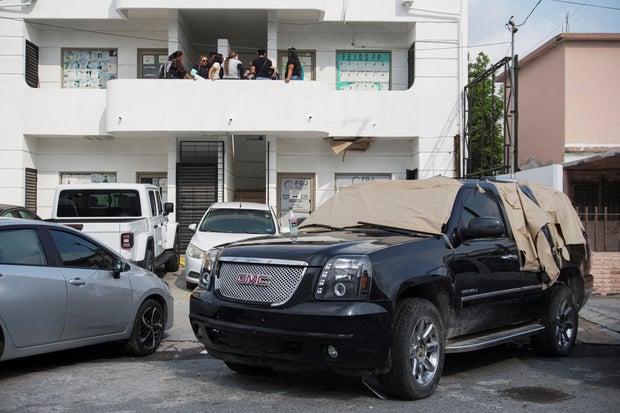The Trump administration said Wednesday it was sanctioning Mexican musician Ricardo Hernández, known as “El Makabelico,” over allegations that the artist was laundering money for a drug cartel.
The move comes after the administration has stripped the visas of some of Mexico’s most famous musicians, targeting those whose genres often explore themes related to cartels.
The U.S. Treasury Department accused Hernández, a musician they refer to as a “narco-rapper,” of being associated with the Cartel del Noreste, CDN, an evolution of the former Zetas Cartel. According to the department, he laundered money for the criminal group through concerts and events. The CDN is one of several Latin American organized crime groups that the Trump administration has designated as a foreign terrorist organization.
The administration alleges that 50% of Hernández’s royalties on streaming platforms go directly to the cartel, leading to his sanctioning alongside leaders of the cartel on allegations that he acted for or on behalf of the criminal group.
Hernández did not immediately respond to a request for comment.
“CDN depends on these alternative revenue streams and money laundering methods to boost their criminal enterprise, diversifying their income beyond criminal activity like drug trafficking, human smuggling, and extortion,” wrote the Treasury Department in a news release.
The sanctions would block the rapper’s properties in the U.S. and freeze financial transactions with any businesses owned by those sanctioned, and threaten secondary sanctions against foreign financial institutions that do business with them.
Hernández, whose stage name is a play on words relating to cartels, performs his songs wearing a black ski mask and often sings songs related to the criminal groups, making reference to street life, cartel lifestyles and the realities faced in cartel-dominated areas.
U.S. Treasury Department
In recent years, young artists like Peso Pluma have brought Mexican genres into the international spotlight by mixing traditional rhythms with trap and other styles, competing with global stars including Taylor Swift and Bad Bunny on streaming platforms.
The genres — primarily “narco-corridos” — have also become the center of controversy because a number of artists sing about cartels and “narco culture” associated with them. Some songs romanticize criminals, while others speak to the harsh realities of youth living in cartel-controlled areas, similar to rap music in the U.S.
Several regions in the country have banned “narco-corridos,” sparking a recent riot during a concert after a singer refused to perform some of his most popular songs.
The music has long fueled a debate about the fine line between artistic expression and censorship, as a number of Mexican states have previously banned performances of certain genres.
In recent months, the Trump administration has revoked the visas of a slew of artists related to the genre. In May, the famous northern Mexican band Grupo Firme, which has taken steps to distance itself from the cartel-centric themes of the genre, announced it would have to cancel an upcoming show in California because its visas were suspended.
In April, the administration said it was revoking the visas of the band Alegres de Barranco after they flashed the face of a cartel boss behind them at a concert, prompting a controversy and even criminal investigations in Mexico. In June, the band released an anti-narco song in a bid to clear its name.
Musicians targeted by criminal groups
Mexican musicians have previously been targeted by criminal groups that pay them to compose and perform songs that glorify the exploits of their leaders.
Such performers often live in close proximity to their drug lord patrons, and can at times get caught up in gang turf battles.
In May, five members of the group Fugitivo were found dead in Tamaulipas state, days after being hired to perform a concert. Their deaths were blamed on suspected drug traffickers.
Stringer / REUTERS
In January this year, a small plane was reported to have dropped pamphlets on a northwestern city threatening around 20 music artists and influencers for alleged dealings with a warring faction of the Sinaloa drug cartel
In 2018, armed men kidnapped two members of the musical group “Los Norteños de Río Bravo,” whose bodies were later found on the federal highway connecting Reynosa to Río Bravo, Tamaulipas.
In 2013, 17 musicians from the group Kombo Kolombia were executed by alleged cartel members in the northeastern state of Nuevo Leon, allegedly because of links to a rival gang.
Agence France-Presse contributed to this report.
